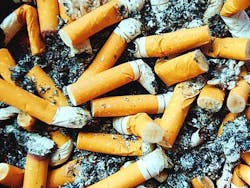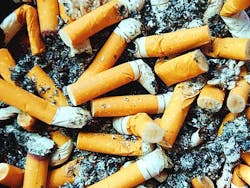Indeed, according to several reports, cigarette butts are the number one littered item on U.S. roadways, as well as the number one item found on beaches and waterways worldwide.
On top of that, according to a new survey conducted by the non-profit public health advocacy firm Legacy, shows that while more than 88% of Americans surveyed think that cigarette butts are an environmental concern, more than 44% of those polled who had ever smoked admit dropping a cigarette on the ground, with nearly 32% saying they’ve flicked a cigarette out of a car window.
Based on the Consumer OmniPulse Survey conducted once a week among a demographically representative sample of 1,200 U.S. adults aged or over, Legacy’s poll also found that over the prior 30 days, Americans surveyed reported seeing discard cigarette butts on sidewalks (80.1%), in parks (32.1%), on playgrounds (16.6%) and on beaches (15.7%).While more than 93% of those surveyed agree that dropping a cigarette butt on the ground is a form of littering, it is alarming that so many smokers still litter them, stressed Cheryl Healton (at left), Legacy’s president and CEO.
"Social norms surrounding litter have shifted dramatically over the last several decades," she noted. "But despite the fact that so many Americans are hyper-concerned about the environment and are eager to recycle household items and pick up litter, there remains a total disconnect when it comes to flicking cigarette butts onto our streets and into our waterways.”
As a result, Legacy is partnering with the Leave No Trace Center for Outdoor Ethics (Leave No Trace) to try an combat what it calls this growing problem of “toxic tobacco trash,” as cigarette butts include plastic filters that biodegrade only under extreme conditions, putting wildlife in danger and wreaking costly havoc on U.S. waterways, parks, beaches and roadways.
Additionally, cigarette butts contain carcinogens that can leach into soil, and chemicals that are poisonous to wildlife, threatening to contaminate water sources, Healton noted.
She hopes this new “Leave No Trace” public awareness campaign not only begins to reverse littering behavior when it comes to cigarette butts, but also highlights the environmental damage caused by what she calculates as “billions” of cigarettes butts being discard annually.
“In an increasingly health and environmentally conscious world, cigarette butts remain one of the only socially acceptable forms of littering left,” Healton added. “We hope to change that.”
We’ll see how that works out.


